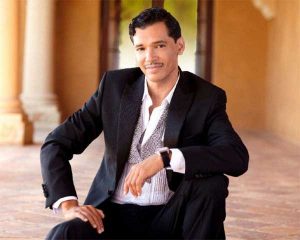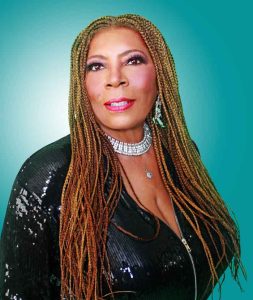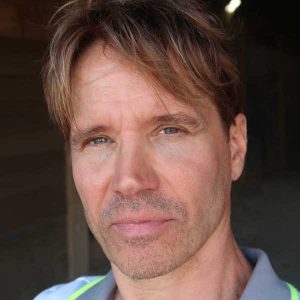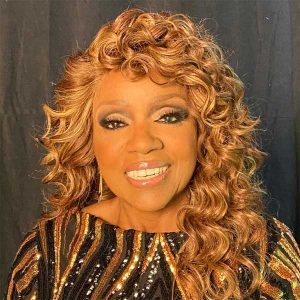“Making this album, I felt like I was seeing a flower or feeling the sunshine for the first time,” says El DeBarge. “I feel like a brand new artist like I just came out to Hollywood from Grand Rapids, Michigan and I’m looking for a record contract—and I’m just as hungry as I was when I started out.”
With Second Chance, one of R&B’s most distinctive and celebrated voices returns to the spotlight after more than a decade and a half away. The album—which features the work of such legendary producer/songwriters as Babyface and Jimmy Jam and Terry Lewis alongside tracks by new hitmakers including Mike City, the Avila Brothers, and Michael Angelo—tells the story of DeBarge’s redemption
following a period of personal turmoil. His triumphant appearance at the 2010 BET Awards, which instantly lit up the international soul blogosphere, was just the first step in a remarkable story of personal and creative transformation.
The sixth of ten DeBarge children, El DeBarge’s signature falsetto anchored sixteen Top 10 hits, both with the family group, DeBarge (“All This Love,” “I Like It,” “Time Will Reveal”) and as a solo artist (“Rhythm of the Night,” “Who’s Holding Donna Now”). In 1990, El teamed up with Quincy Jones to create the unforgettable smash “The Secret Garden,” which also featured Barry White, Al B. Sure!, and James Ingram. The last new music he released was the 1994’s acclaimed Heart, Mind, and Soul.
As he returned to the studio after a turbulent time that ultimately led to his incarceration, though, DeBarge discovered that his songwriting touch had not left him. “These songs are my spiritual memoir, my mental DNA,” he says, “and they came to me on a need-to-know basis from the Lord. I gather it all up at that moment and try to process and structure it into a three- or four-minute song—and that’s not easy to do. These are great big, huge experiences, from personal and business relationships to the house that was lost or the prison sentence served.”
The song that initially kicked off the project was “Format,” which later had a guest verse added by 50 Cent. DeBarge says that the song “really represents where I’m at musically—not changing who I am or my style of writing, just switching up the format, taking a different route to reach the same destination.”
But it was when he began recording the title track that Second Chance took on its full meaning. “It was a mystery how this album was going to evolve,” he says. “But the minute I stepped to the microphone to sing that song, I started crying. It took me a while just to get through the first line. I knew then that this whole album would be full of emotion and conviction. That song opened me up, and it was never the same.”
Though DeBarge has been absent from the music scene, his sound and his legacy never completely disappeared. Such stars as the Notorious B.I.G., Ashanti, and Mariah Carey covered or sampled his hits, and he contributed to tracks by DJ Quik and the RZA.
Yet even as interest in his music remained high, he says that he was unable to sing or write during his prison term. “Prison was very depressing, very antagonizing,” he says. “There was nothing about being there that inspired me. I just prayed, read a lot, and had great anticipation for that day when they said, ‘you’re released and you’re going home.’”
As a result, when he decided to get back to work, DeBarge had no idea what to expect from his unmistakable voice, with its three-octave range. “When I opened my mouth to sing, my chops and my range were still there,” he says, the relief still audible in his recounting. “I was filled with so much joy, so overwhelmed and so grateful.”
DeBarge credits Interscope Records Chairman Ron Fair, the Executive Producer of Second Chance, with guiding him through a difficult period of transition. “He was a pillar of strength, and he championed me through every step of this process,” says the singer. “I could never describe what he means to me—he actually reminds me of Berry Gordy.”
Though DeBarge was excited to work with young writers and producers who grew up listening to his music, it was a special thrill going back into the studio with some of R&B’s greatest masterminds. “Babyface, Jimmy and Terry—they’re not just my musical peers, but qualified people who understand me as an artist and as a person,” he says. “I had heard about Mike City and Michael Angelo, I knew about their talent, but these people are on a whole other level. The chemistry is so different, it’s just great.”
In the great DeBarge tradition, most of Second Chance is concerned with matters of the heart, but El’s own tribulations and lessons echo through many of the songs. “Joyful,” he says, is about “embracing the struggle, not trying to resist, and knowing that you’re going to win—not just thinking that you can win, but that you will.” The impassioned “Sad Song,” produced by Christian “Davis” Stalnecker, resonates with “what I’ve gone through in relationships, some of my heartbreak,” according to DeBarge. “Things I’ve lost to drugs, relationships damaged, and also everyday situations, just somebody treating somebody wrong.
“I’m forthcoming on this album,” he continues, “and I take the blame where I need to, but I also show that I’m bigger than the struggle, it’s not bigger than me. I learned to slip forward, not backward. I learned from my mistakes, and I’ll never go down that road again.”
With this extraordinary set of songs, El DeBarge begins a new chapter in an uncommon life—accepting responsibility and looking ahead, with a new appreciation for his gifts and talents. For a man who reached stardom at a young age, he exudes maturity, in his words and his art, as he demonstrates why everyone deserves a second chance.
“I feel strength, having had the experiences I’ve had,” says DeBarge. “I have confidence. I know what I’ve gone through and that I’ve overcome it, it didn’t overcome me. Now I’m stronger, I’ve embraced it, and I’m going all the way.”
SOULFUL EL DEBARGE, SMOOTHER THAN EVER, DEBUTS MUSIC FROM HIS NEW ALBUM SECOND CHANCE ON “THE BET AWARDS” SHOW
First Album In 16 Years To Tell R&B Star’s Inspiring Story Of Redemption
El DeBarge’s triumphant return to the stage at the 2010 “BET Awards” on June 27th was only the beginning of life’s second chance for one of R&B Pop’s most distinctive and popular voices. On the star-studded show, DeBarge performed the title track from his forthcoming aptly titled album Second Chance, to be released this fall by Geffen Records, and a medley of his R&B smash hits “All This Love, “I Like It,” Time Will Reveal,” and “Rhythm Of The Night.” The soulful performance by the charismatic DeBarge opened an exciting new chapter for the man whose emotional, uplifting music has romanced one generation of fans and is set to do the same for another.
“I want the world to know that everybody deserves a second chance,” says DeBarge. His long-awaited fifth solo album, Second Chance tells his story of redemption, which followed a period of personal turmoil for the immensely talented singer and songwriter. Earlier, his tender falsetto and smooth love songs resulted in 16 Top 10s both with his family group DeBarge, one of America’s most popular young R&B Pop acts of the ‘80s and as a solo artist. But El continued to be heard even after exiting the scene following 1994’s Heart Mind And Soul, a collaboration with Babyface. Everyone from The Notorious B.I.G. and Ashanti to Mariah Carey and Patti LaBelle has covered or sampled hits featuring him as lead singer, many of which he also wrote and produced. Now the original is back—refreshed, rededicated, and ready to take his place once more among the genuine stars of R&B.
Songs on Second Chance were co-written and co-produced by some of music’s most notable hitmakers, including Jimmy Jam and Terry Lewis, Babyface, Mike City, Michael Angelo, Mishka, the Avila Brothers, and Ron Fair.
Q&A With El DeBarge
Q: What do you want to tell us about this album? What is your message?
A: I want the world to know that tomorrow is full of second chances, and all your fears should be left behind you.
Q: Why did you write the song “Second Chance”?
A: I wrote “Second Chance” to commemorate all the struggles I went through, and I feel it speaks to struggles in the souls and the hearts of people who are going through what I went through and who want a second chance.
Q: How are you feeling being back?
A: I’m very grateful to be back. It’s joyful, it’s scary, it’s all of that.
Q: Describe your connection to your fans.
A: I love my fans. I like being up close and personal with them, so I really like being on tour more than I like just being in the studio.
Q: Are you a spiritual person?
A: I have a close relationship with God. From the moment I wake up in the morning, the first thing I do is to get on my knees and pray. He’s everything to me. He’s my music. He’s my source of creativity. He’s my breath.
Q: What is the El DeBarge sound, and how has it changed and evolved over the years?
A: The El DeBarge sound is soulful, it’s joyful, it’s filled with intricate harmonies. It talks about life, it talks about love… it hasn’t changed, though. It’s the same.
Q: What’s your songwriting process like? Where do you draw inspiration from?
A: I draw inspiration from walking down the street, from driving, from being in crowds and just vibing off people, but I like to begin my songwriting process by sitting at the piano. That way I can critique and develop what I’m hearing musically.
Q: You’ve overcome a lot in the past few years. What would be your message to fans?
A: I lost a lot of time, I lost a lot of good friends, but I’m back, though there were some serious consequences. You don’t want to go down that road. You don’t need to experiment with drugs. Some people say that experience is the best teacher, but you don’t need to experience that. Just learn from my mistakes.
Q: You’ve said recently that self-denial was your first step toward drug abuse, and you lost touch with reality. What’s the best way of staying true to yourself?
A: Keep people around you that were in your joy period of life. That’s the most authentic period of your life, and that’s mostly your childhood and your teens, rather than your “good times” or “bad times,” and don’t ever lose that. Don’t succumb to the new “friendships” that just come out of nowhere. That’s not going to do it. That will get you in trouble right there.
Q: What brings joy to your life?
A: A good song makes me feel joyful. I like hearing chords and pretty melodies; I brighten up if I hear something that sounds good. Simple things like that – watching the sun come up, watching the sunset – and last, but definitely not least, a beautiful woman.
Q: Can you talk about some of your favorite tracks on the album?
A: One of my favorite tracks is “How Can You Love Me So Much, Girl?” produced by the Avila Brothers and Jimmy Jam and Terry Lewis. Another is “Serenading You.” That’s for lovers who really want to serenade their woman, and it’s written by Mike City. I have quite a few of them.
Q: What can your fans expect from you?
A: Oh, we’re going to have a good time when I get back on stage. It’s going to be so joyful! We’re going to sing some of the old songs, some of the new songs – we’re just going to have some fun.







